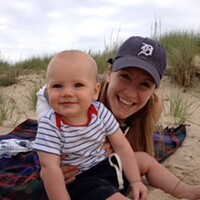My kid hates the snow
Loading...
It is the first winter season since my 1-year-old son began walking. Playing outside has become the perfect afternoon excursion for my mobile toddler, especially in the temperate climate of Norfolk, Va., where we currently live.
When the once-in-a-decade deep freeze came to town last week, snow also came with it, much to the chagrin of many neighbors. I realized that while our family lives here as part of a Navy assignment, there are many people who choose to live here because its normal weather patterns include relatively warm temperatures most of the time.
However, winter storms actually arrived in Norfolk this January, and brought bitter cold and snow with them, something this area hasn’t seen in years.
As snow lovers, my husband and I couldn’t wait to take our little guy outside after the first big snow. We swooned. Four inches of powder waiting right outside our door, a winter wonderland for a little kid.
We took out the camera, dressed my son in a full fleece body suit his grandmother sent him. The suit has a hood and bear ears, and makes him look more like an Ewok than a bear. But he makes an adorable Ewok, and we were sure he would stay warm as he played happily in the snow.
He hated the snow.
We tried to talk him into it. My husband picked up a little snow and tossed it in the air. “Whee! Look, William! Snow!”
My son's face quickly froze into a grimace from the brisk wind whipping through our front yard, his running nose creating a frozen snot-stache on his upper lip.
"Look, William, isn’t this fun?" I said in a sing-song voice, willing my toddler to enjoy the cold through my own gritted teeth. "Yay! We are having so much fun!"
We stayed outside for approximately seven minutes. About three minutes in the front yard, then four minutes in back yard, which offered a little more shelter from the breeze and less snow. We were determined to take a few precious pictures of our son smiling and playing in the snow. We instead snapped a few pictures of smiling parents holding a bewildered looking kid.
When he started to whimper, we submitted. After fifteen minutes spent retrieving winter gear from the attic and five minutes spent wrestling a toddler into a fleece bear suit, we lasted less than ten minutes outside.
There are a few things as expectant parents that you look forward to before your kid even arrives. You play future-memories in your head long before they are acted out in real life. Playing in the snow was one of those things for me and my husband.
I learned early on to take most expectations that I had built up around being a mom and throw them out. When, by chance, something has happened in real life that matches something I romanticized before William showed up, I’m elated.
Will’s icy reception to the snow is accompanied by lots of other dashed expectations in early parenthood. Like homemade baby purees met with pursed lips, a crocheted Yoda hat ripped off by the ears at first test, and spit up covered clothes in every, single, picture, taken in his first seven months.
What’s more important is that I have learned to shift expectations, and be on the lookout for new memories that pop up in the most unexpected places at any time, not those that have already taken shape in my head. It’s been one of the most valuable parenting skills I have learned, leaving me ready for so many special moments.
A few days after testing the snow, we visited the aquarium in nearby Virginia Beach, Va. The visit came at the end of a long afternoon spent running errands. Instead of his usual mid-day nap at home, Will slept in the car while we grocery shopped for the week ahead. Not sure if we might have a wilting toddler on our hands, my husband and I decided to wing it and wait to see how our son responded.
He loved it. Face pressed up to the tanks, high-fiving the fish through the glass, he had a blast. He took to the fish in the water like a fish in water and surprised me and my husband both. Expecting nothing more than a quick adventure together, we enjoyed watching our son make a whole lot of new memories, indoors with the tropical species instead of out with the snow birds.
We’ve ventured into the snow a couple more times since his first encounter. He is as wary of it as he was that first day. We know not to force it, just to let him try it at his own pace, and meanwhile we will stay on the lookout for that first hint that he loves the snow. And when that happens, we will remember to play it cool, as if we were expecting him to love it all along.








